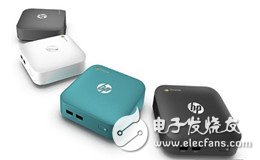Although the entire PC industry was slightly depressed under the pressure of the tablet, Intel's desktop business is actually not as bleak as expected. Intel's PC vice president and general manager of the desktop platform group Lisa Graff said that in the fourth quarter of last year, Intel's Core i5 and i7 processors created sales records in the series, not only from ordinary consumers, but also from commercial organizations such as banks. Did not rush into the mobile side, but stay on the desktop platform.
Toy-sized Intel NUC is perfectly integrated into the work environment
In fact, Intel is actively expanding the field of desktop devices, bringing more changes. For example, the ultra-small computer NUC is a new generation of mini desktop host. Of course, workstations and gaming PCs still need large chassis to achieve good cooling, but the future desktop PC for the average consumer obviously needs a simpler form.
"TV-like" tablet integrated machine
In the past year, we have seen companies such as Lenovo and Sony launch huge tablet PCs, which are actually Windows 8 tablets with at least 20-inch screens. The differentiated experience brought by the big screen is obvious. You can use it as a streaming media player (TV) in any corner of the room, such as taking a dish while watching a video in the kitchen, or at a desk. Run the Office document on it. Although the body is not too light, it is acceptable to move indoors. This feature brings some interesting feature merges, and obviously you no longer need an old kitchen TV.
Lisa Graff believes that the PC and TV industry may have some product crossovers and mergers in the future. Open platforms, streaming media and portable design will be the focus. These products are not limited to desks or living rooms, but rather Can be used anywhere in the home.
Laptop with Real Sense technology
Not only that, but Intel also demonstrated "Real Sense" technology at this year's CES show to help desktop PCs achieve a better gaming experience. The "Real Sense" technology is similar to Microsoft's Kinect. With the built-in depth of field camera, the game operation mode of gesture and somatosensory is very suitable for desktop tablet and portable all-in-one.
Obviously, flattening the desktop is a constant vision of the entire PC industry. As early as 2007, Microsoft introduced the operating platform of the "PixelSense" desktop concept. Although it was later taken over by Samsung and eventually failed, its concept did not stop. Turning the desktop into a "television" that can be moved at will, or a product that flattens on the desktop for Monopoly games, has come true from science fiction.
Miniaturization until modularity
Last year, Intel continued to promote its NUC mini-computer and upgraded its lower-power Atom Bay Trail processor, which sold more than 1 million units in 2013. In addition, including Google also launched the Chromebox host running the Chrome OS desktop system, the latest models for the business conference field, also received widespread attention.
Obviously, miniaturization can provide a more convenient form of use for business and some consumer users. In the end, products like NUC will evolve into a modular form, allowing users to freely transform between powerful configurations and portable mobiles for a more diverse experience.

silicone fiberglass sleeve, silicone rubber fiberglass sleeving, silicone coated fiberglass sleeving, glass fibre sleevingfiberglass silicone sleeve
Dongguan Zhonghe Electronics Co., Ltd. , https://www.zhonghesleeving.com